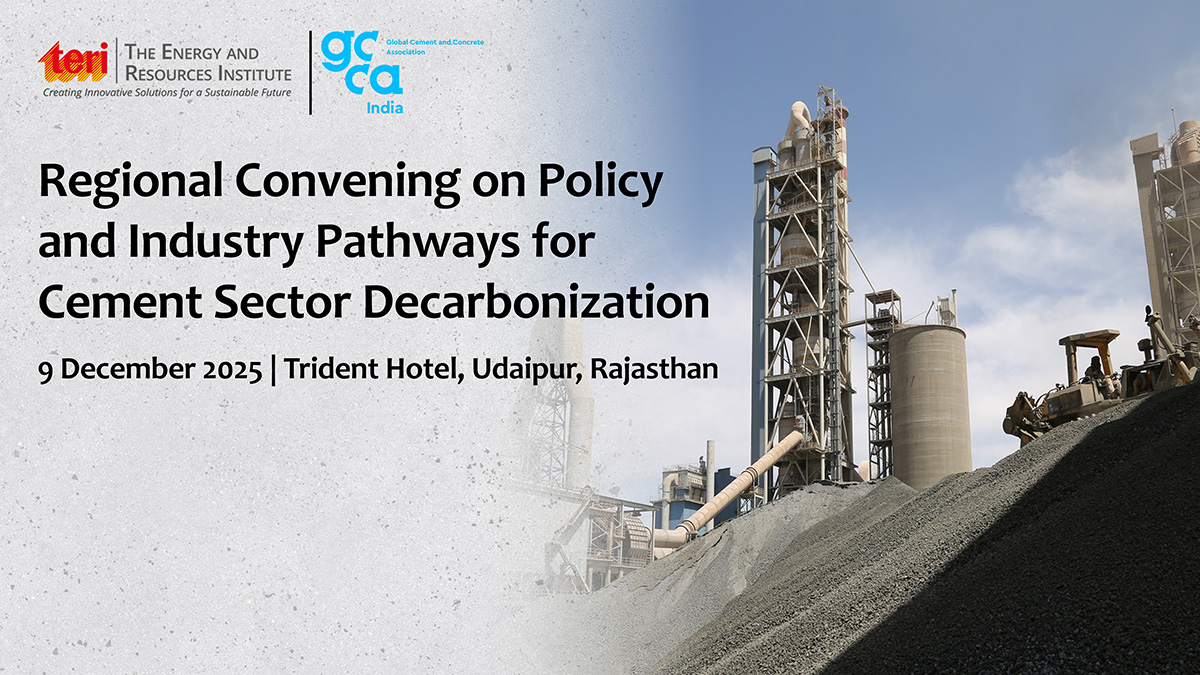Regional Convening Focused on Policy and Industry Pathways for Cement Sector Decarbonization

TERI and GCCA (Global Cement and Concrete Association) India are hosting a 'Regional Convening Focused on Policy and Industry Pathways for Cement Sector Decarbonization' on December 9, 2025, in Udaipur.
The cement and concrete industries are an integral part of the construction sector and contribute to about 13 per cent of global Gross Domestic Product (GDP) (GCCA, 2021). According to the International Energy Agency (IEA), the cement sector is the third largest industrial energy consumer in the world and the second largest industrial emitter of CO2. The cement industry was responsible for about 8 per cent of global emissions in 2022 (WEF, 2024). The demand for cement, the key ingredient of concrete, can be attributed to infrastructural development and the growth of construction sector with rapid urbanization across the world.
Concrete is one of the most consumed resources globally with its usage surpassing that of all other building materials combined. The increasing adoption of concrete in the construction of eco-friendly, sustainable, and resilient buildings and infrastructure will further promote the growth of the cement industry. There has also been a steady shift in economies across the globe from producing concrete on small project sites using bagged cement to utilize factory production of ready-mix or precast concrete.
Cement production is highly emission intensive and is globally considered as one of the ‘hard-to-abate’ sectors. There are technological solutions that could be implemented to achieve ‘close to zero’ emissions by the cement industry. However, decarbonizing the cement sector is more than a technological transition. Some of the radical decarbonization technologies such as ‘Carbon Capture, Utilization, and Storage’ (CCUS), electrification of kilns, and use of new innovative production techniques which are currently at the lab/pilot stage or being demonstrated would become commercially available only in the long term. CCUS will be crucial for achieving net zero emissions in the cement sector. Therefore, addressing the emissions challenge would require a broader systemic transformation.
The convening aims to foster collaborative exchanges and learning on innovative decarbonization approaches within the cement sector, bringing together perspectives from India, Vietnam, and Indonesia to explore holistic strategies spanning both demand and supply aspects of the cement and concrete value chain—with the objective of advancing low-carbon solutions and aligning regional policies, technologies, and institutional frameworks to support ambitious decarbonization goals.
Participants attending this convening include a wide spectrum of the sector’s value chain: leaders from the cement and concrete industries, civil society organizations, technical experts, academic researchers and infrastructure developers. The regional convening is poised as a dynamic platform for dialogue, best practice sharing, and the forging of new partnerships to collectively accelerate the sector’s transition toward a net-zero future.
Participation by invitation only.
